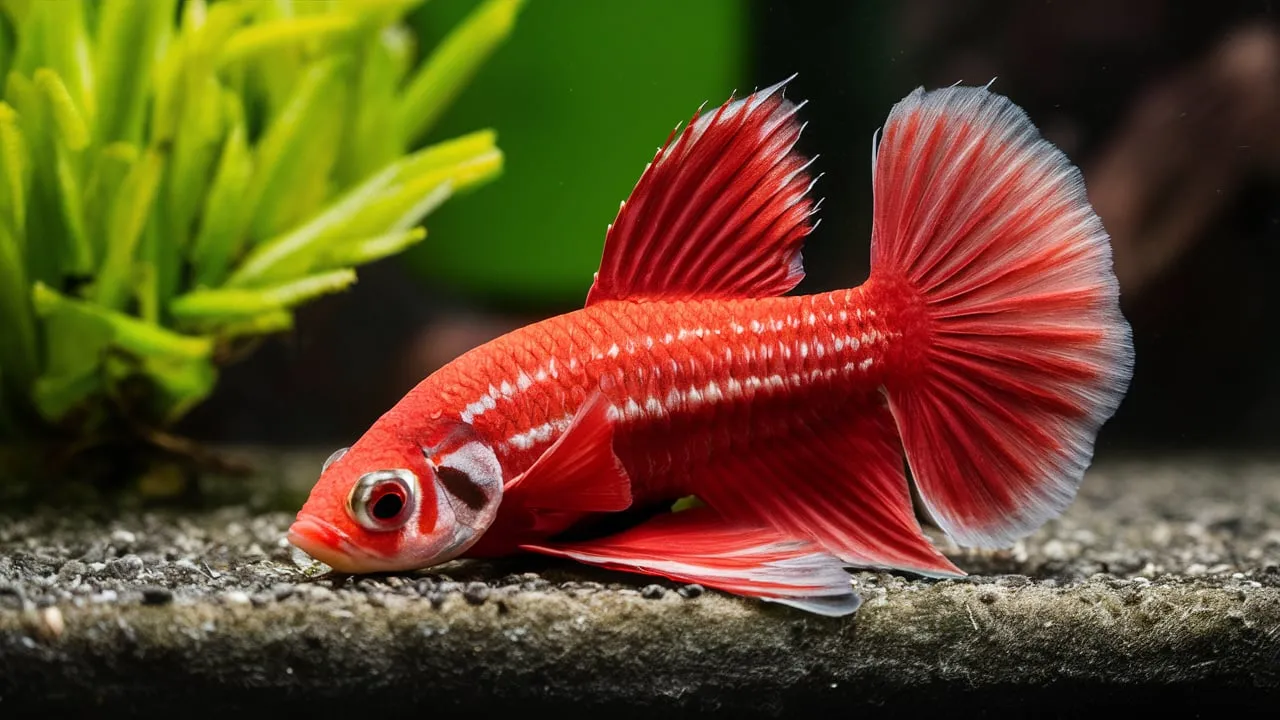As a Betta fish enthusiast, I understand the concern when your beloved Betta fish is found resting at the bottom of the tank. This behavior can be alarming, but it’s important to understand the potential causes and how to properly care for your Betta to ensure its health and wellbeing.
Betta fish, scientifically known as Siamese Fighting Fish (Betta splendens), are a popular aquarium species known for their vibrant colors and distinctive flowing fins. These fish are typically active and tend to swim near the water’s surface, so when they are found motionless at the bottom of the tank, it can raise questions about their wellbeing.
Why Betta Fish Laying At Bottom of Tank?

1. Illness or Stress
One of the most common reasons for a betta fish to lay at the bottom of the tank is that it is experiencing illness or stress. Bettas are sensitive fish and can easily become stressed by water quality issues, changes in their environment, or even compatibility problems with tank mates. Illnesses such as swim bladder disease, bacterial infections, or parasitic infestations can also cause a betta to exhibit this lethargic behavior.
2.Resting or Sleeping
Betta fish, like many other aquatic creatures, require periods of rest and sleep. It is normal for a healthy betta to spend time resting at the bottom of the tank, especially during the night or when the lights are dimmed. This is not a cause for concern, as long as the fish is alert and responsive when the tank is disturbed.
3. Acclimation to a New Environment
When Betta fish are introduced to a new tank, they may initially spend more time resting at the bottom as they adjust to the new surroundings. This is a common behavior and should subside as the fish becomes more comfortable in its new home.
4. Territorial Behavior
Betta fish are known to be territorial, and in a tank with limited space, they may claim the bottom as their territory. This is more common in males, as they are more aggressive and may assert their dominance by guarding the bottom of the tank.
5. Oxygen Deprivation
If the water in the tank has low oxygen levels, the betta may lay at the bottom in an attempt to get closer to the surface where there is more oxygenated water. This can be caused by overcrowding, poor water circulation, or inadequate filtration. Ensuring proper aeration and water movement can help prevent this issue.
Addressing the Issue
If your Betta fish is consistently resting at the bottom of the tank and exhibiting signs of distress, such as labored breathing, loss of appetite, or visible signs of illness, it’s important to take action. Here are some steps you can take:
Check Water Quality:
Maintaining optimal water conditions is paramount for the health and well-being of Betta fish. Key water parameters such as pH, temperature, and ammonia levels must be diligently monitored and maintained within the recommended ranges. Fluctuations or imbalances in these parameters can create a stressful environment for Betta fish, compromising their immune system and making them susceptible to various health issues. Clean, stable water quality is essential for preventing constipation and promoting overall digestive health in these delicate aquatic creatures.
Provide a Comfortable Environment:
Providing a suitable environment is crucial for Betta fish well-being, including their digestive health. A minimum tank size of 2.5 gallons is recommended to offer sufficient space for these active fish to explore and thrive. Incorporating live plants or decorative hiding spots into the aquarium can significantly contribute to stress reduction. These elements create a sense of security and privacy, allowing Betta fish to relax and exhibit natural behaviors. A well-furnished tank promotes overall health and can help prevent stress-induced digestive problems.
Monitor for Signs of Illness:
Regular observation of your Betta fish is essential for early detection of potential health issues. While constipation is a concern, it’s crucial to be vigilant for other common ailments such as fin rot, ich, or swim bladder disease. These conditions can often accompany or exacerbate digestive problems. If you notice any unusual symptoms beyond constipation, it’s advisable to seek professional guidance from a qualified veterinarian specializing in aquatic animals. Early intervention is key to successful treatment and preventing further complications.
Adjust Tank Mates:
Tank compatibility is crucial for the well-being of Betta fish, particularly in relation to their digestive health. If you choose to house other fish species with your Betta, it’s imperative to select compatible tank mates that won’t harass or intimidate the Betta. Aggressive or territorial fish can cause significant stress, leading to various health issues including constipation. A harmonious tank environment is essential for maintaining the overall health and well-being of your Betta fish.
Gradually Acclimate to Changes:
Introducing changes to your Betta fish’s environment should be done gradually to avoid unnecessary stress. Whether adding new decorations or performing a water change, it’s essential to acclimate your Betta fish slowly to the new conditions. Abrupt alterations can disrupt the fish’s delicate balance and trigger stress responses, potentially leading to digestive issues. By implementing gradual changes, you allow your Betta fish time to adjust and maintain a healthy, stress-free environment.
Conclusion
With information of Betta Fish 247 by understanding the potential reasons behind your Betta fish’s resting behavior and taking appropriate steps to address any underlying issues, you can help ensure the health and wellbeing of your beloved aquatic companion.

Related Posts
Female Betta Care: A Comprehensive Guide
Understanding Betta Fish Water
What Are Clamped Fins On Betta?